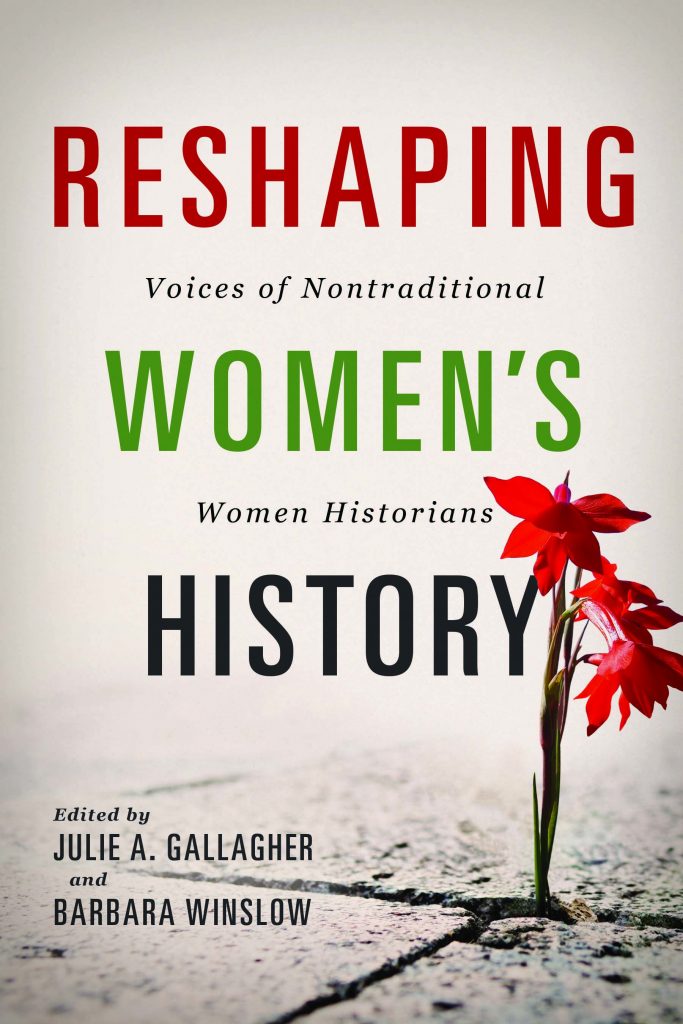The following is a guest post by Julie Gallagher and Barbara Winslow, co-editors of Reshaping Women’s History: Voices of Non-Traditional Women Historians. Julie Gallagher is an associate professor of history and women’s studies at Penn State Brandywine. She is the author of Black Women and Politics in New York City. Barbara Winslow is a professor emerita of Brooklyn College of the City University of New York. She is the author of Sylvia Pankhurst: Sexual Politics and Political Activism and Shirley Chisholm: Catalyst for Change.
Reshaping Women’s History: Voices of Non-Traditional Women Historians was published in 2018 by the University of Illinois Press. A book of powerful autobiographical essays, it captures the voices of eighteen remarkable scholar-activists, all of whom are the recipients of the Coordinating Council for Women in History’s (CCWH) Catherine Prelinger Award. Through their scholarship, Prelinger Award recipients have made field-altering interventions and introduced us to previously unacknowledged historical actors, almost all of whom were women. In their compelling essays, the authors reflect their personal life experiences and at the same time they address issues all-too-familiar to women in the academy: financial instability, the need for mentors, explaining gaps in resumes, and coping with gendered family demands and biases that, despite decades of feminist activism, persist for too many women.
It is of no small significance that in these days of shrinking research budgets and swelling ranks of contingent labor that the CCWH continues to give Prelinger Award. Given annually, at $20,000 it is among the largest competitive awards for scholars researching women’s history. There have been four impressive Prelinger recipients since Reshaping Women’s History was published and we want to highlight here who they are and why their work is so important. In 2016, Frances Raenae McNeal won the Prelinger Award and recently completed her doctoral dissertation, African Native American Women’s Rhetorics of Survivance: Decolonization and Social Transformation. In this path-breaking study, McNeal challenges dominant narratives and settler colonial paradigms while underscoring the sovereignty of the women and the interrelated (her)stories of both African American and Native women.
Charlene J. Fletcher was the 2017 Prelinger Award recipient. An exceptional scholar activist, Fletcher’s work explores the experiences of confined African American women, examining places other than carceral locales, including mental health asylums and domestic spaces. Prior to her doctoral studies, Fletcher led a prisoner reentry initiative in New York City, assisting women and men in their transition from incarceration to society. Her work with individuals and families impacted by domestic violence and incarceration, she notes, fuels her passion for her work today.
The 2018 Prelinger awardee, Lori Michelle Key, is an Air Force veteran, single mother, and care giver for her elderly mother, at the same time that she is working on her highly original study, “We’re All Americans Now: How Mexican American Identity, Culture, and Gender Forged Civil Rights in World War II and Beyond.” Her work demonstrates how U.S. Latina women’s wartime involvement shaped ideas about gender and sexuality in the twentieth century.
Jessica Waggoner is the 2019 Prelinger awardee.Her book manuscript, “Crip Activisms: Race, Gender, and the Roots of Disability Consciousness, 1900-1950” tracks the relationship between emergent forms of disability activism and early twentieth century literature and culture, and what strategies this early disability consciousness can offer contemporary disability social movements. Waggoner’s and the other stories demonstrate the centrality of the day-to-day experiences of women and their contributions to a wider understanding of the multifaceted ways in which of history is researched, written, and experienced.
By Julie Gallagher and Barbara Winslow

